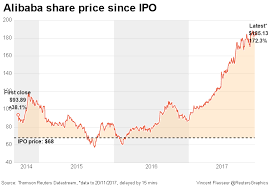Financial markets determine the stock prices but do not control them. There are several factors at play that drive the stock market affecting companies such as the Alibaba share price. There is no explicit equation that can help you predict how the stock prices are going to behave hence the risk involved in trading shares. We can broadly classify these factors into three, i.e. fundamental, technical and market factors. Here is a breakdown of the factors that affect share prices.
- Demand and supply
These are the main forces that control the prices of any market out there, not limiting it to the financial markets. When the demand exceeds the supply, meaning that there are more buyers than sellers, the prices tend to rise. Vice versa, if the supply exceeds demand meaning there is surplus, the share prices go lower.
- Dividend announcements
Once companies announce the payment of dividends on their shares, their share prices increase in the stock market. However, if the rate of dividend is not what investors anticipated, then the share prices reduce. Whereas, if they exceed their expectations, the share prices are likely to skyrocket.
- Management profile
The management of a company significantly affects the shares of a company. If it comprises of educated, skilled and experienced individuals in their respective fields, then the share prices are higher because investors anticipate maximization of their wealth. If the management has a poor reputation or track record, the share prices fall.
- Government stability
When the government of a country is stable, traders feel confident in investing in companies and thus the share prices, for example, Alibaba share price goes up. The vice versa is applicable. Furthermore, production thrives in countries with stable leadership.
- Industrial relations
A good relationship between the workforce and management fosters productivity and thus increase in revenues and profits. It, in turn, translates to high share prices. On the other, if there are constant cases of strikes, boycotts, or other forms of industrial action, the productivity is low and thus low-profit margins. It leads to reduced share prices
- Levels of foreign investment
There is a certain market appeal that comes with multinationals and generally companies that spread across other nations. It attracts investors, of course, only if they are making profits, thereby having high share prices in the stock markets. An increase in foreign investments translates to an increase in share prices.
- Effective regulation
Stock markets run transparently to encourage investors to trade in them. Therefore, more investors lead to high demand levels and thus, high share prices. However, if the regulations are ineffective, and there are scams and scandals now and then, the investors lose confidence and not invest as much. It adversely affects share prices.
In conclusion, stock prices fluctuate for various reasons, such as those above. While it is impossible to predict the actual prices of companies such as Alibaba share price, you can study the pattern and speculate the trend at which the prices will move. Demand and supply fundamentally affect share prices.





